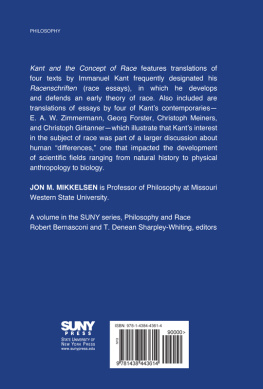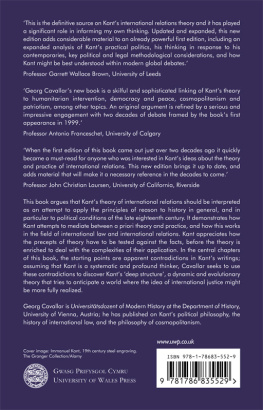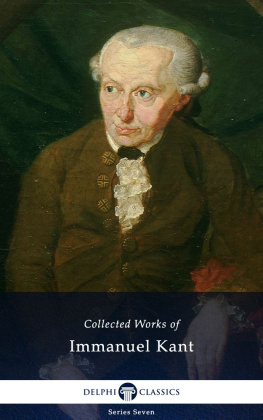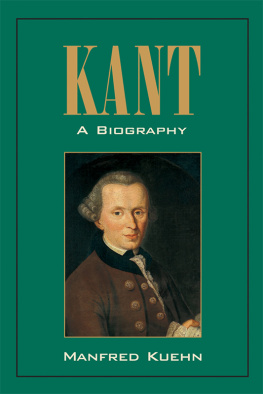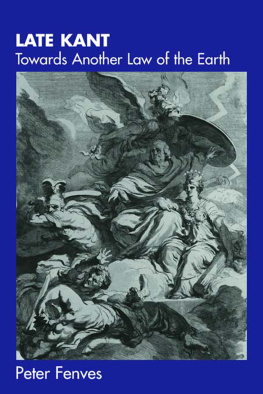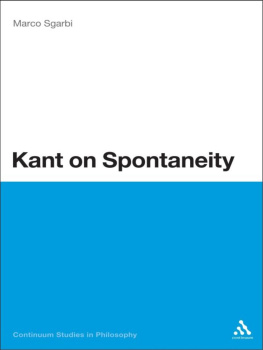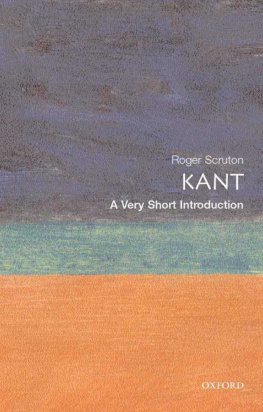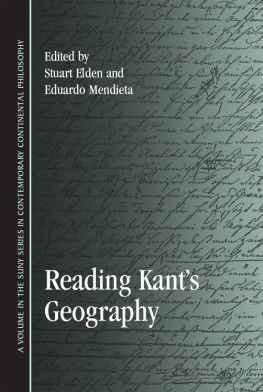Kant and the Concept of Race
SUNY series, Philosophy and Race
Robert Bernasconi and T. Denean Sharpley-Whiting, editors
Kant and the Concept of Race
Late Eighteenth-Century Writings
Translated and Edited by
J ON M. M IKKELSEN
Cover: Gordan Poropat / istockphoto
Published by State University of New York Press, Albany
2013 State University of New York
All rights reserved
Printed in the United States of America
No part of this book may be used or reproduced in any manner whatsoever without written permission. No part of this book may be stored in a retrieval system or transmitted in any form or by any means including electronic, electrostatic, magnetic tape, mechanical, photocopying, recording, or otherwise without the prior permission in writing of the publisher.
For information, contact State University of New York Press, Albany, NY
www.sunypress.edu
Production by Diane Ganeles
Marketing by Anne M. Valentine
Library of Congress Cataloging-in-Publication Data
Kant and the concept of race : late eighteenth-century writings / translated and edited by Jon M. Mikkelsen.
p. cm. (SUNY series, Philosophy and race)
Includes bibliographical references (p. ) and index.
ISBN 978-1-4384-4361-4 (hardcover : alk. paper)
1. Kant, Immanuel, 17241804Views on race. 2. RacePhilosophy. 3. RaceStudy and teaching. I. Mikkelsen, Jon M. II. Kant, Immanuel, 17241804. Selections. English. 2012.
HT1506.K36 2012
305.8001dc23
2011042033
10 9 8 7 6 5 4 3 2 1
Contents
Acknowledgments
Some books are the result of what their primary creators are wont to think of as noble, self-consciously determined, long-term goals; others might better be described as the willfully sustained product of the confluence of chance events. The present volume belongs far more to the second of these categories than the first, and it is certainly not the sort of book on Kant that I could have ever imagined publishing during the years when I, under the supervision of A. C. Genova in the philosophy department at the University of Kansas, was working on the dissertation on Kants third critique, the Kritik der Urteilskraft, that I defended in the summer of 1987.
I did, however, during that time, working together with a KU graduate school colleague, Joseph Van Zandt, complete a very rough translation of Kants 1788 Teutscher Merkur article, ber den Gebrauch teleologischer Prinzipien in der Philosophie (On the use of teleological principles in philosophy), which I had hoped would be of some importance for my dissertation research, as it might well have been, but wasnt. Some years later, while enjoying a dinner held in conjunction with some conference or other either sponsored or cosponsored by the philosophy department at the University of Memphis, I overheard Robert Bernasconi (then the departments Moss Professor of Philosophy) at a nearby table discussing with someone the need for translations of a couple of Kant texts for publishing projects on which he was working. I made a point then of talking with Robert later that evening and informed him that I had a draft translation of one of the texts in which he had expressed interest, which he cordially agreed to take a look at. That draft, however, which Robert first read on the computer paper printout from the mainframe FRED QED line-oriented text editor that I had made use of in typing up the translation that Joe and I had prepared, was deemed wanting. I nevertheless told Robert I was certain I could improve on that earlier work, and eventually, with many probing questions and much help from him, earlier versions of two of the translations that appear in this volume (Kants 1777 and 1788 articles) were deemed acceptable for publication in the two volumes either edited or coedited by Robert that appeared in 2000 and 2001 (referenced in the Selected Bibliography below).
Near final versions of all the translations included in this volume were completed six or seven summers ago, not, however, without the help of several individuals who merit special mention. In particular, I would like to thank Mark Larrimore (associate professor of religious studies at Eugene Lang College, The New School for Liberal Arts), whose comments on the Kant texts of 1775, 1777, and 1785 were especially helpful; I only wish that Mark had had the time to make comments on my translation of Kants 1788 text, which, I am certain, would also have benefitted from his attention. The translation of Christoph Meiners 1790 article similarly benefitted greatly from the assistance of two individuals who provided me with even more extensive criticisms than did MarkHugh A. West (professor of history, University of Richmond), and another friend from graduate school, Lisabeth Hock (now associate professor of German at Wayne State University). The translation that appears in this volume owes much then to comments from both West and Lisa on my first draft translation, which I had apparently thought much better than it mustjudging from their comments, especially those of Westhave been. Since neither West nor Lisa ever reviewed the translation that appears in this volume, I must, however, take full responsibility for the published version.
For the translations of Latin and French text and titles, I gratefully acknowledge the assistance of my Western colleagues, respectively, James MacGregor (associate professor of history) and Susan Hennessy (professor of French), as well as John Lomax (professor of history at Ohio Northern University), who filled in for MacGregor with work on what proved to be some of the most difficult passages at a critical time when my Western colleague (who, in the meantime, has accepted a position with Georgetown Universitys School of Foreign Service in Qatar) was not available.
I wish also to thank the two anonymous reviewers for SUNY Press who read the penultimate version of the manuscript in the period from late 2009 through the spring of 2010, especially the one who was kind enough to take the time to offer more criticism than praise, and to another dear friend from my years as a KU graduate student, Bernard Williams, who read and commented on many of the translations more than once and who also did a preliminary copyediting of the entire manuscript during the period when it was being read by the SUNY reviewers. With so much assistance, I might hope that there be fewer errors and other difficulties in the published text than the attentive reader will no doubt still find. However, even though I have generally followed the recommendations provided me by others, sometimes I have not. Further, the introduction to the Zimmermann translation was completely rewritten when, after my anonymous reviewers had already done their work, I finally found the time during the summer of 2010 to consult Petra Feuerstein-Herzs fascinating and very informative 2004 University of Braunschweig dissertation on Zimmermann (see have not followed completely the recommendation of one of the reviewers that I subdue the defensive tone of my introductions to the 1788 Kant article and the 1790 racist-screed from the hand of Christoph Meiners, and it was only during the late summer months of 2010 that the Chronology was significantly expanded and reframed to include events both from the period prior to 1770 and after 1800as well as entries that sketch the historical development of the abolitionist movement from the beginnings of the modern slave trade in the seventeenth century through the first half of the nineteenth century. Among these changes from the draft of the manuscript read by my anonymous reviewers, I am especially hopeful that the Chronology, which owes much to the efforts of others identified at the beginning of that section, serves well the limited purposes for which it is intended. The issues that somewhat unexpectedly emerged in the preparation of this portion of the manuscript proved indeed to be so vexing in the case of some of the entries, that it was only in the last couple weeks of August 2011 that my work on it was finally completed.

